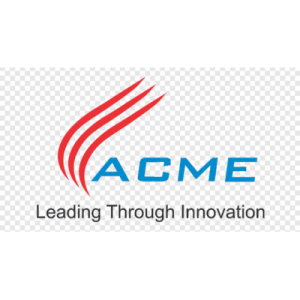
ACME Solar Holdings IPO Closed
Already have an account? Apply now
Schedule of ACME Solar Holdings
| Issue open date | 05 Nov 2024 |
| Issue close date | 08 Nov 2024 |
| UPI mandate deadline | 08 Nov 2024 (5 PM) |
| Allotment finalization | 11 Nov 2024 |
| Refund initiation | 12 Nov 2024 |
| Share credit | 12 Nov 2024 |
| Listing date | 13 Nov 2024 |
| Mandate end date | 23 Nov 2024 |
| Lock-in end date for anchor investors (50%) | 11 Dec 2024 |
| Lock-in end date for anchor investors (remaining) | 09 Feb 2025 |
Note: The schedule is tentative. The anchor lock-in period ends 30 days after the actual allotment date for 50% of the shares and 90 days after for the remaining portion. The allotment status can be checked on the registrar's website and the exchange website.
About ACME Solar Holdings
ACME Solar Holdings Limited was established in 2015 to consolidate the ACME Group’s renewable energy business. It is a renewable energy company, specializing in solar, wind, hybrid, and firm and dispatchable renewable energy projects. It is one of the largest Independent Power Producers (IPP) in the country, with an operational capacity of 1,320 MW in solar projects and a significant pipeline of under-construction projects totalling 2,220 MW. The company focuses on developing, building, owning, operating, and maintaining utility-scale renewable energy projects while generating revenue through sales to government-backed entities.
Financials of ACME Solar Holdings
IPO Issue size
| Funds Raised in the IPO | Amount |
| Overall | ₹2900 crores |
| Fresh issue | ₹2395 crores |
| Offer for sale | ₹505 crores |
Utilisation of proceeds
| Purpose | INR crores (%) |
| Investment in subsidiaries for repayment/prepayment of borrowings | 1795 (74.95%) |
| General corporate purposes | 600 (25.05%) |
Strengths
- ACME Solar Holdings has a comprehensive portfolio that includes solar, wind, hybrid, and firm and dispatchable renewable energy projects, making it one of the largest independent power producers in India.
- The ACME Group has been an early entrant in the solar IPP business in India. It commissioned its first solar power plant in Fiscal 2012 and has developed 2,719 MW of solar power projects.
- The company has established power purchase agreements that ensure revenue generation from various government-backed entities, securing its financial stability.
- The company has signed a memorandum of understanding with the Government of Uttar Pradesh for a significant closed-loop pump storage project, showcasing its growth strategy in renewable energy.
Risks
- The renewable energy sector is subject to regulatory changes that can impact project approvals, tariffs, and operational guidelines, introducing uncertainty into future earnings.
- The company’s revenue is significantly tied to government policies and incentives for renewable energy projects. Any changes in these policies could negatively affect profitability.
- The company depends on the top 10 off-takers, which contributed 89.97% of revenue from operations in 2024.
- ACME Solar does not have long-term agreements with suppliers and typically sources the required components through purchase orders.
Subscription Figures for ACME Solar Holdings
Subscription numbers as of 07:00 pm on 8 Nov 2024:
| Category | Shares Reserved | Shares Bid | Subscription (No. of times) |
|---|---|---|---|
| Qualified Institutional Buyers (QIBs) | 3,15,27,272 | 11,15,56,023 | 3.54 |
| Non Institutional Investors | 1,57,63,636 | 1,52,68,737 | 0.97 |
| Retail Individual Investors (RIIs) | 1,05,09,090 | 3,25,50,444 | 3.10 |
| Employees | 4,03,225 | 6,40,254 | 1.59 |
| Total | 5,82,03,223 | 16,00,15,458 | 2.75 |
Note: When evaluating IPOs, one should not just look at grey market premiums. The subscription numbers give a clearer picture of investor interest. Read this article to learn how to track the live IPO subscription data.